Hola una vez más.
Hi again.
Hi again.
En el siguiente enlace podéis ver nuestros próximos viajes fotográficos y de observación de aves y mamíferos nacionales y al extranjero. Espero que os gusten y os animéis a venir conmigo. Una experiencia que nunca olvidareis.
In the following link you can see our next national and foreign Birds and Mammals photographic and observation trips. I hope you like them and I encourage you to come with me. An experience that you will not forget.
En esta ocasión os muestro lo que pude fotografiar en el viaje organizado a primeros de septiembre para ver la migración de las aves planeadoras en el estrecho de Gibraltar, así como aves limícolas y el Paraje natural Brazo del Este.
This time I show you what I was able to photograph on the organized trip at the beginning of September to observe the migration of soaring Birds at the Strait of Gibraltar, as well as wading Birds and the Brazo del Este Natural Area.
El tiempo fue muy bueno pero la mañana del domingo el viento de levante sopo con demasiada fuerza lo que hizo que la migración de ese día no fuese tan buena como l del sábado por la mañana.
The weather was very good, but on Sunday morning the easterly wind blew too hard, which meant that the migration that day was not as good as the one on Saturday morning.
A la llegada a la provincia de Cádiz, visitamos unas pequeñas lagunas que están muy degradadas medioambientalmente pero que albergan bastantes especies de aves. En la foto un morito común (Plegadis
falcinellus).
Upon arrival in the province of Cádiz, we visit some small lagoons that are highly degraded environmentally but are home to many species of Birds. In the photo a Glossy Ibis.
Calamón común (Porphyrio
porphyrio).
Purple Gallinule.
Había varias cercetas pardillas (Marmaronetta
angustirostris).
There were several Marbled Teals.
También había bastantes chorlitejos grandes (Charadrius
hiaticula), chicos (Charadrius
dubius) y patinegros (Charadrius
alexandrinus), así como correlimos menudos (Calidris
minuta).
There were also quite a few Great
Ringed Plover, Little Ringed Plover and Kentish
Plover, as well as Little
Stint.
Macho de malvasía cabeciblanca (Oxyura
leucocephala).
White-headed
Duck male.
Otro.
Another one.
Cuchara común (Spatula
clypeata). En la foto una hembra.
Northern
Shoveler. In the photo a female.
Martinete común (Nycticorax
nycticorax).
Night
Heron.
Y finalizamos el día de llegada observando a los ibis eremitas (Geronticus
eremita).
And we end the day of arrival observing Northern
Bald Ibis.
Esta especie ha sido reintroducida en Cádiz, Proyecto Eremita, pues llevaba ya más de 400 años de su desaparición. Como el número de nacimientos sigue siendo inferior al de muertes se continúa reintroduciendo ejemplares nacidos en cautividad. Esperemos que dentro de poco esta especie no necesite ya de la interferencia humana para poder seguir subsistiendo en libertad por España.
This species has been reintroduced in Cadiz, Projecto Eremita, as it had been more than 400 years since they disappeared. As the number of births is still lower than that of deaths, captive-born specimens continue to be reintroduced. Let us hope that soon this species will no longer need human interference in order to continue subsisting free in Spain.
Todos lo que vimos estaban anillados y muchos de ellos llevaban un dispositivo de rastreo que, en el caso de este individuo, la batería se carga con un pequeño dispositivo solar.
All of the ones we saw were ringed and many of them were carrying a tracking device which, in this individual's case, battery is charged by a small solar device.
Cuando se aproximaba el anochecer, se posaban en unas torres eléctricas para pasar la noche.
As dusk approached, they would perch on electrical towers for the night.
También acudían a dormir garcillas bueyeras (Bubulcus
ibis).
Cattle Egrets also came to sleep.
Un inmaduro de pito real ibérico (Picus sharpei) macho.
An immature male Iberian Green
Woodpecker.
Y grandes bando de grajillas occidentales (Corvus
monedula).
And large flocks of Eurasian
Jackdaw.
En la mañana del sábado fuimos temprano al observatorio de Cazalla. El tiempo era muy bueno y no hacía viento. Este día, la migración fue muy activa y pudimos observar gran cantidad de aves que pasaban por el estrecho a África para pasar el invierno. He puesto las fotos que timé en este día y la mañana del día siguiente juntas por especies. En la mayoría de los casos las aves pasaban muy altas.
On Saturday morning we went early to the Cazalla observatory. The weather was very good and it was not windy. This day, the migration was very active and we were able to observe a large number of birds that passed through the strait to Africa to spend the winter. I've put the photos I took on this day and the morning of the next day together by species. In most cases the birds passed very high.
Había mucha gente observando el paso migratorio de las aves.
There were many people watching the Birds migration.
Por los alrededores del observatorio se podían ver algunos cisticola buitrón (Cisticola
juncidis).
Around the observatory you could see some Zitting
Cisticola.
Y también mosquiteros musicales (Phylloscopus
trochilus).
And also Willow Warbler.
Pasaron bastantes vencejos pálidos (Apus
pallidus).
Quite a few Pallid Swifts passed by.
Gavilán común (Accipiter
nisus).
Eurasian
Sparrowhawk.
Culebrera europea (Circaetus
gallicus).
Short-toed
Eagle.
Águila calzada (Aquila
pennata) morfo claro.
Pale morpho Booted Eagle.
Morfo oscuro.
Dark morpho.
Milano negro (Milvus
migrans).
Black
Kite.
Algunos bandos de abejaruco europeo (Merops
apiaster).
Some flocks of European bee-eaters.
Alimoche común (Neophron
percnopterus).
Egyptian
Vulture.
Vimos un gran bando de cigüeñas negra (Ciconia
nigra) pues venían más de cuarenta ejemplares. Al estar bastante cerca de donde estábamos, no pude sacar una foto de todo el grupo.
We saw a large flock of Black Storks as more than forty specimens came. Being quite close to where we were, I couldn't get a photo of the whole group.
Se pusieron a ciclear con milanos negros (Milvus
migrans) y con águilas calzadas (Aquila
pennata).
They started cycling with Black Kites and Booted Eagles.
Buitre leonado (Gyps
fulvus).
Griffon
Vulture.
Hubo mucho paso de abejero europeo (Pernis
apivorus). Siempre me llama la atención los distintos morfos que presenta esta especie.
Many Honey Buzzards passed. I am always struck by the different morphs that this species presents.
Cuando la migración empezó a decaer, decido visitar otras zonas. Fuimos hasta el observatorio de la playa de los Lances.
When the migration started to decline, I decide to visit other areas. We went to the observatory on Los Lances beach.
Me lleve una grata sorpresa al poder contemplar este ejemplar de aguilucho cenizo (Circus
pygargus) melánico. Son difíciles de ver pues hay muy pocos.
I was pleasantly surprised to spot this melanistic Montagu's Harrier. They are difficult to see because there are very few.
Una lejana pagaza piquirroja (Hydroprogne
caspia).
A far away Caspian Tern.
Macho de tarabilla europea (Saxicola rubicola).
Common
Stonechat male.
Hembra.
Female.
Otro macho.
Another male.
Las chumberas estaban en flor.
Prickly pears were in bloom.
Después de la visita a la playa de los Lances fuimos a una marisma cercana. En la foto un grupo de flamencos comunes (Phoenicopterus
ruber).
After visiting Los Lances beach, we went to a nearby marsh. In the photo a flock of Greater
Flamingo.
Un águila pescadora (Pandion
haliaetus).
An Osprey.
Avocetas comunes (Recurvirostra
avosetta).
Pied Avocet.
Había bastantes especies de aves, En la foto un correlimos común (Calidris
alpina).
There were quite a few species of birds, in the photo a Dunlin.
Correlimos zarapitín (Calidris
ferruginea).
Curlew Sandpiper.
Correlimos tridáctilo (Calidris
alba).
Sanderling.
Había muchas gaviotas de Audouin (Larus
audouinii).
There were many Audouin's Gulls.
Y por último visitamos el Paraje de la Janda. En la foto un grupo de cigüeñas blancas (Ciconia
ciconia) que llegaban de migración.
And finally we visit the Paraje de la Janda. In the photo a group of White Storks that arrived from migration.
Garza real (Ardea
cinerea).
Grey
Heron.
Vimos dos elanios comunes (Elanus
caeruleus).
We saw two Black-shouldered
Kite.
Había varios faisanes vulgares (Phasianus
colchicus). En la foto un bonito macho.
There were several Common Pheasants. In the photo a beautiful male.
Hembra.
Female.
Al atardecer empezamos a ver bastantes tórtolas europeas (Streptopelia
turtur).
At sunset we began to spot quite a few European
Turtle Dove.
El domingo después de ver el paso migratorio nos fuimos a otra de las marismas que nos quedaba de paso para ir al Brazo del Este. En la foto un chorlitejo grande (Charadrius
hiaticula).
On Sunday, after seeing the migration at the Strait of Gibraltar, we went to another of the marshes that was passing through to go to the Brazo del Este. In the photo a Great
Ringed Plover.
Un bando de espátulas comunes (Platalea
leucorodia).
A flock of Eurasian
Spoonbill.
Zarapito trinador (Numenius
phaeopus).
Whimbrel.
Correlimos zarapitín (Calidris
ferruginea).
Curlew Sandpiper.
Un joven de la misma especie.
A juvenile of the same species.
Correlimos común (Calidris
alpina).
Dunlin.
Garceta común (Egretta
garzetta).
Little
Egret.
Pagaza piquirroja (Hydroprogne
caspia).
Caspian Tern.
Algunos de los chorlitos grises (Pluvialis
squatarola) conservaban bastante el plumaje nupcial.
Some of the Gray Plovers kept their breeding plumage fairly well.
Había bastantes agujas colinegras (Limosa
limosa).
There were quite a few Black-tailed
Godwit.
Correlimos gordos (Calidris
canutus).
Red Knot.
Alguno de ellos estaban aún muy bonitos.
Some of them were still very pretty.
Archibebe común (Tringa
totanus).
Common
Redshank.
Y el final del viaje fue en el Brazo del Este. Hacía mucho calor y no paseamos mucho. Como era de esperar había muchos moritos comunes (Plegadis
falcinellus).
And the end of the trip was in Brazo del Este. It was very hot and we did not walk much. As expected there were many Glossy Ibis.
Espátula común (Platalea
leucorodia).
Eurasian
Spoonbill.
Un numeroso grupo de canasteras comunes (Glareola
pratincola).
A large flock of Collared
Pratincole.
Como podéis ver detrás de los moritos comunes (Plegadis falcinellus) se veían bastantes patos. Como os decía antes, el calor impidió que pudiese estar fuera de la furgoneta para hacer un barrido en busca de las especies que había. Había 40 ºC y sin ninguna sombra donde protegerte.
As you can see behind Glossy Ibis there were quite a few Ducks. As I was saying before, the heat prevented me from being outside the van to do a sweep in search of the species that were there. It was 40 ºC and without any shade.
Cigüeñas blancas (Ciconia
ciconia) a lo lejos.
White Storks in the distance.
Y un buen bando de gaviotas sombrías (Larus fuscus).
And a large flock of Lesser
Black-backed Gulls.
Si queréis suscribiros a este blog de los viajes que hacemos pincha en el siguiente enlace: Suscribirse y haz clic en ¿ Quieres suscribirte a nuestro blog?
If you want to subscribe to this post about the trips we do, click on the following link: Susbcribe and click on: Do you want to subscribe to our blog?
If you want to subscribe to this post about the trips we do, click on the following link: Susbcribe and click on: Do you want to subscribe to our blog?
Espero que os haya gustado y hasta pronto.
I hope you like it and see you soon.
I hope you like it and see you soon.
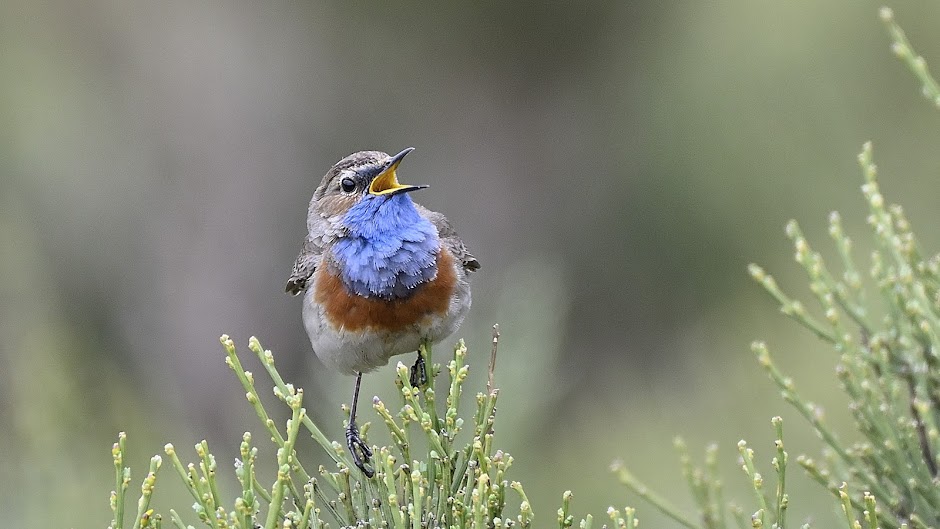






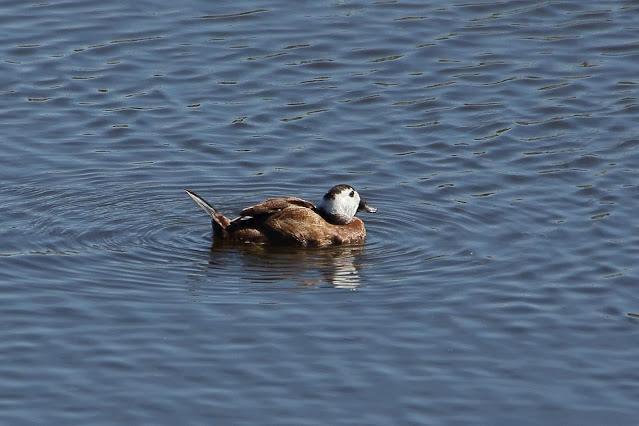








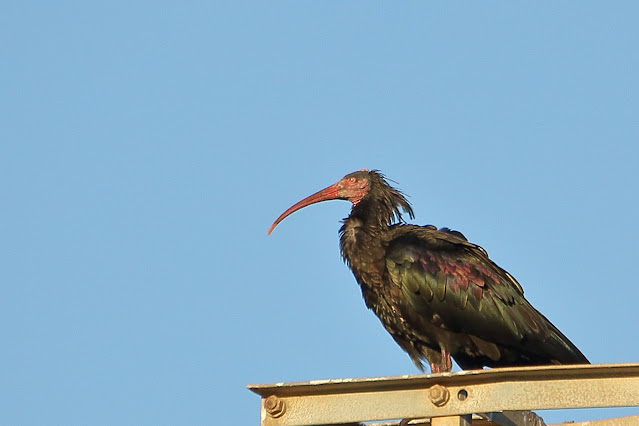









































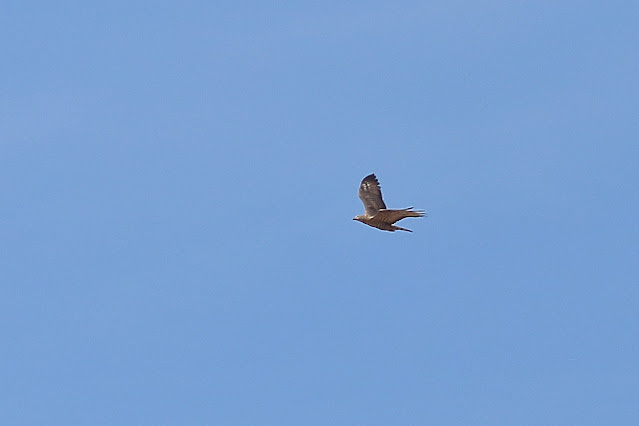
























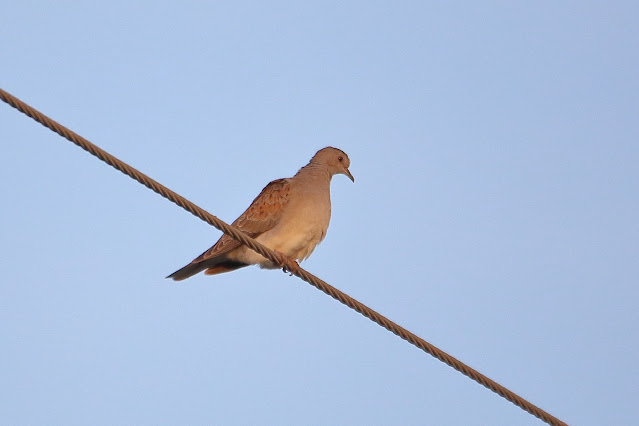


























No hay comentarios:
Publicar un comentario